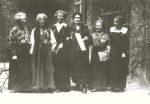Lida Gustava Heymann
Women's International League for Peace & Freedom (WILPF) Congress, Zürich 1919
- Augspurg,
Anita; Despard,
Charlotte; Genoni,
Rosa; Hamilton,
Alice; Heymann,
Lida Gustava; Kulka,
Leopoldina
‘Women and mothers in Germany who have lived through this war, aren’t you ready to do what is in your power to protect the coming generations from equal catastrophes?’ (Schenk, Herrad. Stuttgart 1981.)
Why
do I think these both women are important
Anita Augspurg and Lida Gustava Heymann belong to the radical wing of the early women’s movement. They objected the war and were engaged for the rights of women. They objected Hitler’s dictatorship because they recognized the danger to the peace in the world.
Activities in Society and Politics
In 1896, Lida Gustava initiated lunch restaurants for working women in Hamburg and opened an after-school care club for girls and boys. She bought a house in the center of the city and opened a women’s center with a library. Besides, she also opened a public bath and a secondary school.
Anita joined the women’s movement in 1891. She had met Rosa Luxemburg during her studies in Zuerich. At “The first congress for Women’s Interests” they voted for the women’s right to take part in elections, their right to have a professional training and the right to work outside the house.
In 1897 Augspurg and Heymann participated in the congress of the “Abolitionist
Federation”, which opposed the state regulations of prostitution and sexual
exploitation of women. About 1902 both women belonged to the board of the federation
“Progressive women’s associations”.
From 1907 the “Magazine for Women’s Voting Rights” is published, later renamed
to “The Woman in the State”.
At the Beginning of the First World War Anita and Lida Gustava travelled
to Den Haag where they attended
“The International Women’s Peace Congress”. In their paper they demand an
immediate end to the war.
In 1918 Augspurg is a member of the interim
parliament in Bayern, but does not get a mandate in the elections. In 1923 she and Lida ask the Bavarian Minister
of Interior to expel the Austrian Hitler from the country, but their request is
denied.
Families and Education
Anita’s parents both are academics. Her father is a lawyer. Their
daughter is liberally brought up. She becomes a gymnastics teacher, besides
this she attends acting lessons. Anita and a friend open a photo studio in
Munich. She begins to reflect about the women’s legal position and decides to
study law in Zurich. She receives a doctorate in law.
Lida Gustava comes from a bourgeois family. She is educated by private teachers at home until she visits a Girls’ High School in Hamburg. After a year in Dresden, she returns home. She starts teaching in a charity school und is the headmistress of a sewing school.
After the death of her father she is financially independent and engages
herself in different social facilities. She joins the German Women’s Movement.
In Berlin she visits the “International Congress for Women’s Activities” and
meets Anita Augspurg.
Henceforth the two women live and work together. In Bavaria they buy a farm. After Hitler’s coming to power they do not return to Germany from a holiday in Switzerland. Until their death they are poor and need support from wealthy friends in Zurich. The German government had confiscated their wealth.
Conclusion
Already in 1902 Anita Augspurg and Lida Gustava Heymann had demanded that
women should be allowed to take part in elections. In 1918 this right was
embodied in the Weimar Constitution. Until women reached equality with men hey
had to wait further thirty years. Unfortunately it was not put into effect
immediately but some years later.
That since 2005 Germany’s chancellor is a woman is certainly the merit of the
early German women’s movement. Unfortunately for a woman it is still very
difficult to reach the top of a large company.
I agree with Hiltrud Schroeder’s statement about the two women (Luxemburg and
Heymann. EDB). ‘Their optimistic view that equal rights for women would mean
also an equal position in society, we share no longer’.
Literature and Links
- Grundgesetz und Verfassungsreform G 1994. München 1996. Himmelsbach, Christiane. Verlaß ist nur auf unsere eigene Kraft Oldenburg 1996
- Schenk, Herrad. Anita Augspurg. In: Hans Jürgen Schultz (Hrsg.) Stuttgart 1981.
- Anita Augspurgs http://www.dhm.de/lemo/html/biografien/AugspurgAnita/ 14.2.14.
- Women‘s Rights http://www.frauenmediaturm.de/themen-portraets/feministische-pionierinnen/anita-augspurg/ 14.2.14.
- L. G. Heymann and A. Augspurg http://www.fembio.org/biographie.php/frau/biographie/lida-gustava-heymann/ 14.2.14.
Picture source
- With the kind permission of the Women's International League for Peace and Freedom Records, Swarthmore College Peace Collection, Swarthmore, U.S.A., www.swarthmore.edu/Library/peace and the friendly support of the FrauenMediaTurm, Köln, Germany, www.FrauenMediaTurm.de




